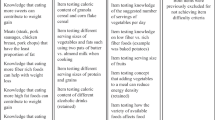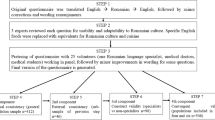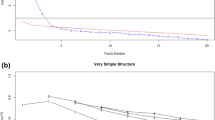Abstract
Background:
Obesity represents a serious threat to health through its association with conditions such as type 2 diabetes mellitus, coronary heart disease and certain types of cancer. Knowledge regarding risk to health is an important determinant of behaviour and is the focus of many health education strategies. To the authors’ knowledge, there is no valid and reliable measure of knowledge regarding the health risks associated with obesity.
Aim:
To validate a short, reliable psychometric scale measuring knowledge regarding the effects of obesity on health, the Obesity Risk Knowledge (ORK-10) scale.
Methods:
The ORK-10 scale was administered to a sample of individuals with no specific obesity-related expertise (n=230) and a sample of experts (n=200). Univariate and multivariate statistical analyses were used to investigate the scale's criterion validity.
Results:
The ORK-10 scale has good internal consistency (Cronbach's alpha coefficient>0.7) and is acceptable for use in a UK adult population with an estimated reading age of 12–13 years. The scale demonstrated strong criterion validity, as those with educational or vocational expertise in the field of obesity achieved significantly higher scores than nonexperts (median 9.0 vs 4.0, Z=−17.364; P<0.001). This relationship was maintained after controlling for the potentially confounding factors of age and level of education. Nonexperts demonstrated low levels of knowledge regarding the health risks associated with obesity.
Conclusions:
The ORK-10 scale meets standard psychometric criteria for reliability and validity. This scale could be used to assess the effectiveness of health education interventions, to target the provision of health information and to investigate the interaction between knowledge and obesity-related behaviour.
This is a preview of subscription content, access via your institution
Access options
Subscribe to this journal
Receive 12 print issues and online access
$259.00 per year
only $21.58 per issue
Buy this article
- Purchase on Springer Link
- Instant access to full article PDF
Prices may be subject to local taxes which are calculated during checkout

Similar content being viewed by others
References
World Health Organization. Obesity: Preventing and Managing the Global Epidemic. World Health Organization: Geneva, 2000.
National Audit Office. Tackling Obesity in England. National Audit Office: London, 2001.
Bless H, Fiedler K, Strack F . Social Cognition: How Individuals Construct Social Reality. Psychology Press: Hove, UK, 2004.
Conner M, Norman P . The role of social cognition in health behaviours. In: Conner M, Norman P (eds). Predicting Health Behaviour: Research and Practice with Social Cognition Models. Open University Press: Buckingham, UK, 1996, pp 1–22.
Peak H . Attitude and motivation. In: Jones MR (ed). Nebraska Symposium on Motivation. University of Nebraska Press: Lincoln, 1955, pp 149–188.
Edwards W . The theory of decision making. Psychol Bull 1954; 51: 380–417.
British Nutrition Foundation. Obesity. The Report of the British Nutrition Foundation's Task Force. Blackwell Science: London, 1999.
Schmitz KH, Jeffery RW . Public health interventions for the prevention and treatment of obesity. Med Clin N Am 2000; 84: 491–512.
Burns CM, Richman R, Caterson ID . Nutrition knowledge in the obese and overweight. Int J Obesity Relat Metab Disord 1987; 11: 485–492.
Hankey C, Lee A, Leslie W, Lean M, McCombie L . Nutrition knowledge in the overweight and obese does not predict inclination to attempt weight loss. Int J Obesity Relat Metab Disord 2004; 28: S136.
Jebb SA, Lang R, Penrose A . Improving communication to tackle obesity in the UK. P Nutr Soc 2003; 62: 577–581.
Schar EH, Gutierrez KK . Smoking cessation media campaigns from around the world: recommendations from lessons learned, World Health Organization Regional Office for Europe. http://www.who.dk/document/e74523.pdf (accessed 24/03/05) 2001.
Department of Health. Delivering Choosing Health: Making Healthier Choices Easier. Department of Health Publications: London, 2005.
Department of Health. Saving Lives: Our Healthier Nation. The Stationery Office: London, 1999.
Peberdy A . Evaluation design. In Katz J, Peberdy A, Douglas J (eds). Promoting Health, Knowledge and Practice. Open University: Buckingham, UK, 2000.
Price JH, O’Connell JK, Kukulka G . Development of a short obesity knowledge scale using four different response formats. J School Health 1985; 55: 382–384.
Banasiak M, Murr MM . Medical school curricula do not address obesity as a disease. Obes Surg 2001; 11: 677–679.
Kan K, Tsai WD . Obesity and risk knowledge. J Health Econom 2004; 23: 907–934.
Kline P . The Handbook of Psychological Testing 2nd edn. Routledge: London, 2000.
Oppenheim AN . Questionnaire Design, Interviewing and Attitude Measurement 2nd edn. Continuum: London, 2000.
Kincaid JP, Fishburne RP, Rogers RL, Chissom BS Derivation of new readability formulas (automated readability index, fog count and flesch reading ease formula) for navy enlisted personnel Naval Air Station: Memphis Tennessee 1975.
Office of National Statistics. Standard Occupational Classification 2000. The Stationery Office: London, 2000.
Tabachnick BG, Fidell LS . Using Multivariate Statistics. International Students Edition 4th edn. Allyn and Bacon: Boston, MA, 2001.
Parmenter K, Wardle J . Development of a general nutrition knowledge questionnaire for adults. Eur J Clin Nutr 1999; 53: 298–308.
Beier ME, Ackerman PL . Determinants of health knowledge: An investigation of age, gender, abilities, personality, and interests. J Pers Soc Psychol 2003; 84: 439–448.
Parmenter K, Waller J, Wardle J . Demographic variation in nutrition knowledge in England. Health Educ Res 2000; 15: 163–174.
Granello DH, Wheaton JE . Online data collection: strategies for research. J Couns Dev 2004; 82: 387–393.
Noar SM, Zimmerman RS . Health behavior theory and cumulative knowledge regarding health behaviors: are we moving in the right direction? Health Educ Res 2005; 20: 275–290.
Kristeller JL, Hoerr RA . Physician attitudes toward managing obesity: differences among six specialty groups. Prev Med 1997; 26: 542–549.
Acknowledgements
We thank all the participants who completed the ORK-10 scale, both in the validation work presented in this paper and in the initial pilot phases. We would also like to thank Mrs Chris Hawkins, the British Nutrition Foundation, the Association for the Study of Obesity, John Lewis of Nottingham, Solihull, and Peterborough and DHL Aviation (UK) Ltd for their cooperation.
Author information
Authors and Affiliations
Corresponding author
Additional information
Supplementary Information line accompanies the paper on Internation Journal of Obesity (http://www.nature.com/ijo)
Supplementary information
Rights and permissions
About this article
Cite this article
Swift, J., Glazebrook, C. & Macdonald, I. Validation of a brief, reliable scale to measure knowledge about the health risks associated with obesity. Int J Obes 30, 661–668 (2006). https://doi.org/10.1038/sj.ijo.0803165
Received:
Revised:
Accepted:
Published:
Issue Date:
DOI: https://doi.org/10.1038/sj.ijo.0803165
Keywords
This article is cited by
-
Weight biases, body image and obesity risk knowledge in the groups of nursing students from Poland and Nigeria
Scientific Reports (2024)
-
Development of the PRE-HIT instrument: patient readiness to engage in health information technology
BMC Family Practice (2014)
-
Preventing childhood obesity during infancy in UK primary care: a mixed-methods study of HCPs' knowledge, beliefs and practice
BMC Family Practice (2011)
-
Preliminary survey of educational support for patients prescribed ocular hypotensive therapy
Eye (2010)



